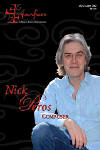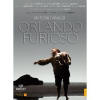Texte paru dans: / Appeared in:

Fanfare Magazine 35:6 (07-08/2012)
Pour
s'abonner / Subscription information
Les abonnés à Fanfare Magazine ont accès aux archives du
magazine sur internet.
Subscribers to Fanfare Magazine have access to the archives of the magazine
on the net.
Naïve
RV728 (DVD)

0822186021484
Consultez toutes les évaluations recensées pour ce cd
~~~~ Reach all the evaluations located for this CD
Looking quickly at the headnote, readers might have a sense of déjà vu—wasn’t this performance released on CD seven years ago? But note the date. Yes, this is a new assault on Vivaldi’s score, featuring the same conductor, the same instrumental ensemble, and the same four singers (Lemieux, Larmore, Cangemi, and Jaroussky) in the four most important roles. Now we can see them, however!
John Story enthused about the original CDs (Naïve OP 30393) in these pages, and I did as well online. In short, Orlando furioso is a very worthwhile score, and the singers really throw themselves into it. That’s still true, although one could argue that the singers are encouraged to “throw themselves” into the action a little too much, and that the production, directed by Pierre Audi, really is, in fact, an “assault” on Vivaldi’s opera. There’s no sense that we are on a magical island, and that Alcina is a sorceress. Instead, the first two acts seem to be set in an upholstery shop, and the last in an insane asylum. While the CDs aspired to restore the opera to its complete state, there are several minor cuts in this production. Most of these contain material alluding to the supernatural, so there seems to have been an attempt to make Alcina and the individuals who turn up on her island into ordinary upper-class folks. Ruggiero, instead of appearing on a hippogriff, simply strolls onstage, and moments later, Alcina’s magical fountains, with which she ensnares him, have been replaced with a pitcher of water. Indeed, stage directions are consistently ignored. At the end of the second act, when Medoro and Angelica are supposed to write of their love for each other on the barks of a nearby laurel and myrtle, they must content themselves with scribbling it on the top and legs of a nearby table. When characters are indicated, in the libretto, as being alone, here you can count on them being anything but. During the last act, Audi places many of the characters on stage together, and they emote furiously at each other and shove each other around, even though there is little in the text to suggest that they are addressing anyone at all. (I was reminded of the boyhood practice of catching crayfish in the local stream, and sticking several of them in a box, shaking it to watch them fight.) In fact, during this final act, I began to wonder if I was watching Marat/Sade instead. The libretto suggests that normalcy is restored at the end of the opera. However, at the final blackout, the lovers are clearly sadder and maybe wiser, poor Orlando clearly remains out of his mind, and Alcina, stripped of her powers, lies in a motionless lump further upstage. To me, it seems bizarre to be so attentive to musical authenticity while treating the drama in such a perverse and fanciful manner. I can’t deny that I find it fascinating to watch, though.
This is an ensemble piece. All of the characters have multiple arias, and weakness in any role could bring the entire opera down. Fortunately, the singing is much less controversial than other aspects of the production, although one could argue that some of it is needlessly over-emphatic. The four repeating cast members do not compare unfavorably to their earlier selves, and the three newcomers are on the same level. Simply said, this is a cast whose members understand how this music should be sung, and who have the voices (and temperaments) to carry it off. Marie-Nicole Lemieux is terrific in the title role, particularly at the end of the second act, and in all of the third, once her character’s madness becomes full blown. The other standouts are Jennifer Larmore, magnetically alluring as the cougar-like Alcina, and Philippe Jaroussky, whose voice is an even more honeyed marvel than it was seven years ago. And, much as one might complain about this production, it does not hurt that the cast acts well and is physically appealing. Even Lemieux, a woman of heroic proportions, is convincing as the titular paladin, although the beard she is given makes her look rather like a Viking! Conductor Jean-Christophe Spinosi, quite the looker himself, is nothing if not energetic, yet he knows when to back off. I don’t expect to hear the opera sung better than this.
Production values, including English subtitles, are fine. The only fault is the production’s lighting, or lack thereof, which has not translated well onto DVD.
Cliquez l'un ou l'autre
bouton pour découvrir bien d'autres critiques de CD
Click either button for many other reviews


